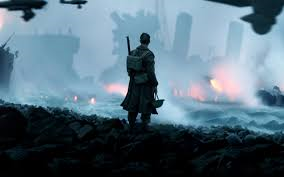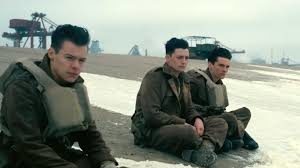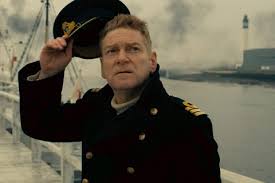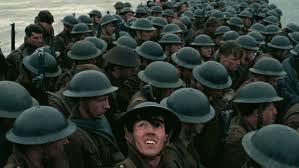Movie Review: Dunkirk (2017)

‘All we did was survive,’ Harry Styles’s young British army private remarks as a word of congratulations is offered to him towards the end of Dunkirk. ‘That was enough,’ he is told in response. It was enough, more than enough at the time and from a subsequent historical perspective. The Allied evacuation which took place between the 26th May and the 4th June, 1940 was referred to as, ‘a miracle of deliverance,’ by Winston Churchill in his seminal ‘We shall fight them on the beaches’ speech. Writer-director Christopher Nolan’s approach to the depiction of this ‘miracle of deliverance’ is to offer us three different perspectives as men fight to survive and a collective nation holds its breath. On land there is the story which centres on Tommy (Fionn Whitehead). We are introduced to him as pamphlets containing crude messages are showered on the isolated soldiers. As Tommy emerges onto the beach at Dunkirk, Nolan and his director of photography Hoyte van Hoytema show us the scale and extent of proceedings in a glorious panorama. The second narrative strand takes place on the sea as Mr. Dawson (Mark Rylance) determines to take his boat out and play his part. His son Peter accompanies him without question; at the very last moment a young friend George joins them as well. The third and final element concerns itself with three Spitfire pilots who endeavour to provide air support to the troops on the ground as well as engage the Luftwaffe. Nolan regular Tom Hardy is the most familiar face here as Farrier.

Throughout his impressive career to date (Dunkirk being his tenth feature), Christopher Nolan has demonstrated a keen interest in time and has regularly challenged the audiences perception of chronology. 2000’s Memento employed a non-linear structure and was relayed to us by a highly unreliable narrator in Guy Pearce’s central character. 2014’s Interstellar had its crew – Matthew McConaughey and Anne Hathaway among them – traverse a wormhole in which time itself was severely dilated. The concept of lucid dreaming in 2010’s Inception also carried with it implications for that very subject – each dream level which Leonardo DiCaprio and his team entered involved an acceleration of time and a heightening of attendant danger. The director does not attempt to be quite as artful here and he presents his strategy via three simple titles which appear early on in the film. The land-based section takes place over a week, the sea over a day, and the air for an hour. Viewers who may not be accustomed to Nolan’s style or this non-linear structure may well scratch their heads at first and ask – Didn’t I already see this? But wasn’t that character elsewhere just a few short minutes ago? The answer to these questions is yes, of course; different perspectives are shown on certain incidents and one can only marvel at how well Nolan manipulates time to his own purpose and to the benefit of the drama he presents. The pacing of Dunkirk is quite relentless – frantic would be a most apt term – from the opening sequence in which Whitehead’s character comes under enemy fire and runs from the streets of the northern French town to the beach. Events in the air involving Hardy’s character are similarly incessant. The score by Hans Zimmer (his sixth collaboration with Nolan) builds crescendo upon crescendo just as the story heaps climactic images and suspenseful scenarios. The historical outcome we may be aware of, but this does not detract from the tension which Nolan masterfully creates. Will Tom Hardy manage to land that plane when his reserve fuel eventually runs out? Will Harry Styles and his buddies make it back to the terra firma of Old Blighty?

Nolan keeps his characters at a distinct remove from us and in may cases we barely know their names. There are no gratuitous back-stories provided here, no cursory footnotes. This is a story of survival first and foremost; the war itself is something which the men barely think of, although, of course, they will be back in active duty if ever they manage to survive this particular experience. To this end there are no stories shared, no real commonality established. Dunkirk is a war movie quite unlike any you may have ever seen before and viewers expecting this decade’s Saving Private Ryan will most likely be disappointed. The land and air sequences are shot in meticulous detail and with no little amount of technical swagger. A sense of total cinema pervades as Hardy and his wing comrades attempt to outguess and circumvent their Luftwaffe counterparts. The same can be said of the land-based action as Whitehead et al do what it takes to live a bit longer. Zimmer’s score employs the backdrop of a ticking watch in order to emphasise the precious hours – the Germans are closing in ever so quickly and it’s only a matter of time. Kenneth Branagh’s Commander Bolton stands on the pier and reflects ruefully on how close home is – ‘You can practically see it from here,’ he says in a downplayed version of his own Henry V. The only real piece of personal drama which occurs in the film takes place on Mr. Dawson’s boat. Picking up a PTSD-affected Cillian Murphy (who is simply known as Shivering Soldier), Dawson informs him that they are headed to Dunkirk. Not surprisingly, the character balks at such a notion – ‘We have to go home,’ he shouts emphatically. ‘If we don’t do this, there’ll be no home to go to,’ Dawson replies. The wider historical significance of the rescue (which exceeded even Churchill’s expectations) is inferred by Nolan at such moments, but he’s far too good a filmmaker to resort to trite cliches or hackneyed speeches. The dialogue of Dunkirk is quite sparse – minimalist to say the least – and Zimmer’s pounding score is similarly devoid of an emotional refrain. Admirers and aficionados of Nolan’s (I count myself among the former group) will by now be well-used to his wrap-up sequence and montage of images at film’s end. Dunkirk has a perfectly satisfactory ending in this regard and it’s perhaps the only point in the film whereby the director chooses the obvious tack – Fionn Whitehead reading Churchill’s famously rousing speech as he and Styles sit forlorn on a train in Dorset. Elsewhere, Nolan also hints at the very valuable weapon of propaganda and the need to cultivate heroes. It’s a dark hour in the nation’s history, the public psyche requires bolstering and then some. Much comment has been reserved for the fact that this is a blood-and-guts story without those very features having much prominence at all. Perhaps Nolan feels – as I do – that the opening sequence from Spielberg’s Saving Private Ryan said it all and simply cannot be topped in terms of visual and aural impact. In any event, the intention here may be to render this more an account of survival rather than war. The sheer horror of conflict is on display in other ways and variations such as a darkened fishing trawler being riddled with bullets and oil igniting on the sea. Mr. Dawson’s rescue mission – the personal drama of the piece as I suggested – takes on a no uncertain poignancy when it is revealed his son, a Hurricane pilot, had died in the opening weeks of the war. Nolan’s preference for practical effects as opposed to grating CGI is well-known, but this is an intensely affecting moment which his particular brand of film-making does not always allow for or even facilitate. Credit therefore where credit is due.

This is a seriously accomplished film from a director who is at the height of his powers. Still in his mid-40s, Nolan may have his detractors, but there are few in the industry today who have an artistic sensibility which marries so effortlessly with a wider commercial cache. If Dunkirk goes on to be a box office success (which I suspect it should do), then nothing else but praise can be directed his way for bringing this important story to the attention of a new generation of cinema-goers. It’s a deeply immersive experience which, at a running time of 106 minutes, is effectively an epic tale told in an avant-garde fashion. Nolan has gone on the record and said that his intention was to deliver a, ‘sensory, almost experimental movie,’ with little in the way of backgrounds and even less with respect to character exposition. I return to those words which Styles’s character utters when he is somewhat taken aback on home soil – ‘All we did was survive.’ The greater historical context informs us that this indeed was enough, more than enough. And Christopher Nolan’s Dunkirk will more than do as a tribute and chronicle of this, ‘miracle of deliverance.’
Rating: A